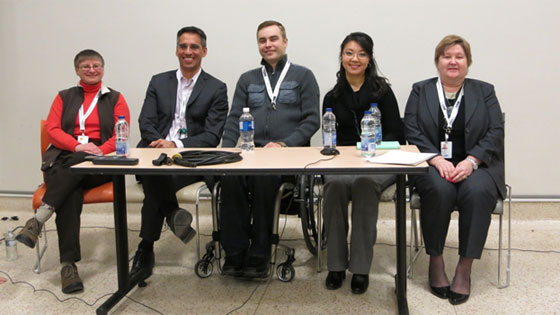
UHN’s Delirium Prevention and Management Steering Committee consists of inter-professional team members from across the organization. (Photo: UHN)
When Josh Forbes woke up at Toronto Western Hospital following a spinal injury from a diving accident in 2011, it was nearly a month before he felt like he was "sober" and once again in control of his mind. During this time he experienced vivid hallucinations and was terrified thinking that a nurse was trying to kill him. When he became violent after an attempt to "protect himself," he woke up in restraints.
"It made it 10 times worse, because not only is someone trying to kill you, but you're restrained and can't do anything to protect yourself," recalls Josh. "There are all kinds of things going on around you and you don't know what is going on or what the reasoning is."
Josh's experience with delirium was so profound that when he came back to Toronto Western for subsequent surgeries, his biggest fear wasn't the surgery. It was the fear of being delirious.
"My second surgery I opted not to take pain meds. I made it 14 hours post op after they put two rods and eight screws in the back of my neck because I was scared of the delirium again." Josh recounts.
Josh's story isn't unique and it's a challenge that health care providers across UHN deal with on a day-to-day basis. Delirium is a change in mental state which occurs suddenly, often within hours or days, fluctuates over hours to days, alters consciousness and disturbs thinking.
Related to this story
- To watch Josh's story, click
here, and type
Delirium2015 for both username and password.
- Please see Collaborative Academic Practice's
delirium page for more information and to access education materials'.
With upwards of one in five of all admitted patients, and 70 per cent of ICU patients, experiencing delirium, the prevention and management of it is a priority initiative being led by
Collaborative Academic Practice, in partnership with Clinical Operations and Psychiatry.

A recent panel discussion on delirium was held at Toronto Western Hospital, featuring (L to R): Linda Kuschnik, Spiritual Care Provider; Jeff Singh, Intensivist and MSNICU Site Director; Josh Forbes, UHN Patient; Judy Jung, Registered Nurse; and Rima Styra, Psychiatrist.(Photo: UHN)
The
Delirium Prevention and Management Steering Committee consists of inter-professional team members from across the organization. It has developed a number of strategies to advance best practice related to delirium screening, prevention and management, including developing a
toolkit and building capacity locally through delirium champions.
To date, more than 150 staff across UHN have attended education sessions on delirium. These champions are now working within their units and sharing this knowledge with their colleagues so together the care teams can proactively screen, prevent and manage delirium. While there are several
non-pharmacological and pharmacological strategies to help patients through this enormously challenging experience, one key strategy is the collaboration of care teams with the families.
"Families are often the first people to tell us that patients are not quite at their norm," explains Judy Jung, a Registered Nurse with Multi Organ Transplant. "It's very scary for them so we describe what might be going on and we assure them that there are resolutions we try to reach.
"At the same time we involve them in giving the patient the care that they need. Whether it be keeping the patient safe at the bedside, verbally reorienting and describing to them that they're safe, in a safe environment and being cared for. Having the family is very reassuring for the patient."
Families and health care teams working together is the premise supporting UHN's
Partner's in Care journey and is an approach Josh whole-heartedly agrees with.
"Family are the people that you trust to separate fact from fiction," he says. "With so many strangers at your bedside on a daily basis, and not remembering who they are, there is no familiarity.
"My family was beneficial to be there and it helped me out a lot."
